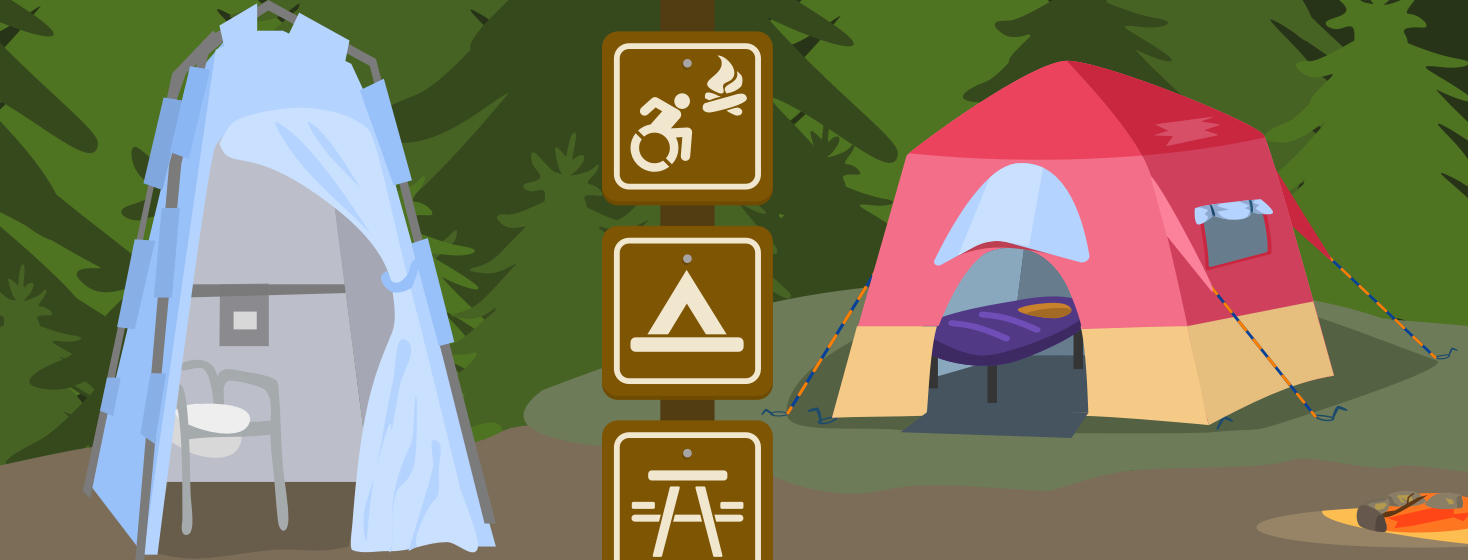MS and the Great Outdoors
While camping last summer, we had neighbors directly behind us occupying the ADA site: a young woman and her companion, a young man in a wheelchair.
They slept in a tent attachment fitted for their truck, cooked breakfast on a camp stove, tended the fire at night, and were gone from the site during the day, exploring the local sights.1
I confess, for all the camping I do (at least six trips annually in the Pacific Northwest), I had not seen an occupied ADA campsite until then. It always makes me wonder why more people with disabilities don’t go camping.
Why go camping?
Good reasons exist for why some don’t go camping. Happily, there are solutions for many of these challenges. As with anything in life, you can find a way to make camping work even if you have MS.
For some — including our neighbors last summer — camping is the perfect getaway precisely because it offers many benefits for those dealing with chronic illness and disability.
Affordable fun
Even if camping isn’t entirely “free,” it’s still a great deal less expensive than a trip requiring resort fees, plane tickets, and spendy dinners out. They also don’t require a major investment in travel.
A good camping trip can be had, whether you are “car camping” with tents and coolers or “glamping” in an RV. You can also rent cabins, yurts or tipis. Listen, we “rough it” just living with MS — there’s no shame in choosing comfort in the great outdoors!
Don’t have a budget for camping? KOA’s annual grant program, #GetOutThereKOA, might be able to make a camping adventure possible for you and your family.2
A customizable experience
Don’t let your MS symptoms and physical limitations keep you from going on an outdoor getaway. Simply plan to accommodate your needs.
For instance, if you overheat easily, then you’ll want to camp where there’s shade, water for swimming or wading, or air conditioning.
If you need to use an assistive device, search out locations that are friendly to your needs. Tent campers might consider using a tent with a vestibule that can store a walker or chair.
Those with stomach issues may want to choose destinations with excellent bathroom facilities. Or, you can create a privacy tent for a bedside commode like this avid camper did.3
Forest bathing
Shin-rin yoku is the Japanese word for the healthy practice of communing with trees. There’s science to back up the benefits of woodsy wanderings: an elevated mood and improved immune system, for starters.
Circadian reset
If you struggle with sleep and fatigue, camping can help you achieve a circadian reset. Circadian rhythms reconnect with the rhythms of the planet when you spend a day or two outside, away from artificial lighting, turning impoverished sleep patterns into healthy sleep-wake cycles.
Tips for easy trips
- Agency-run parks and grounds require ADA-compliant facilities, but quality will vary. You can preview images of them online to ensure they suit your needs.
- While online, check out campground maps and reviews. Consider: How level are the sites? How close are the facilities? How clear are the lanes? How much shade is there?
- If you live in a camping mecca like I do, you know parks book up fast. Though ADA sites don’t always fill up, reserving in advance is highly recommended.
- And speaking of planning… if you discover you love camping and want to go again, hooray! You’ll be inspired to create a packing list for equipment, gear, food, and other items to simplify future trips. Smart Camping Guide offers this downloadable list as a place to start.4
- Don’t want to cook but want “real” food? Consider camping near local eateries. Some parks have onsite concessions or general stores which sell premade dinners or hot meals. Pre-making and reheating casseroles, salads, or breakfast items also works.
- Look into nearby activities. You might find nature talks and tours, ice cream socials, horseback riding, and outdoor movies. Fun, right? If you have kids, a destination with a groovy playground will make it a trip they’ll remember.
- Try to book your sites over the phone. Talking to a human being at the park, sharing your needs, may yield a better site choice than you may have found on an online campground map.
- If you’re tent camping, use tall air mattresses with flocking. They’re easier to get in and out of and far more comfortable than mattress pads.
Resources for MS-friendly camping
Camping clubs and specialty camps that cater to people with MS and their families:
- Camp Independence
- Champ Camp and Discovery Camp (NMSS)
- Deliver the Dream Retreats
- Handicapped Travel Club
- Wilderness Inquiry camp programs
Other resources
- Adaptive Outdoorsman camping equipment retailer
- KOA
- National Park Service All In!
- RoadTrip America
- RVing Accessibility Group

Join the conversation